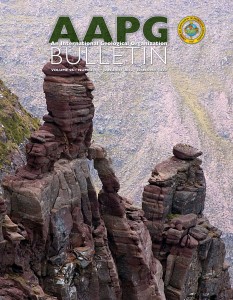Apply
The Structural Diagenesis Initiative (SDI) supports students in the Department of Geological Sciences, Jackson School of Geosciences and Department of Petroleum and Geosystems Engineering, Cockrell School of Engineering as well as occasional students having other affiliations. The Energy & Earth Resources (EER) program, combining engineering, geoscience, and economics, is an important part of the structural diagenesis initiative. Jon E. Olson and Stephen E. Laubach serve on the EER faculty. Many students are based at the Bureau of Economic Geology in the Jackson School of Geosciences.
How to Apply: Opportunities for Students
For more information contact a faculty or staff member from your department who is associated with SDI. Prospective students should consult the web sites of the Jackson School of Geosciences and Department of Petroleum and Geosystems Engineering.
SDI Student Research Opportunities
Support is available for student thesis projects in the Department of Geological Sciences, Department of Petroleum & Geosystems Engineering, and EER. Projects cover a wide range of issues in fractured rock geology and engineering and diagenesis, and include modeling, laboratory and subsurface and field-based studies and the practical and economic aspects of geoscience and engineering technology.
- The Projects page lists some current project opportunities.
- The Thesis and Dissertation page lists current and recently completed student and postdoctoral projects.
Project Faculty and Research Staff
A list of senior scientists associated with the initiative can be found on the project research collaborators page.
The following brief profiles outline research interests of some of the participants.
| Stephen E. Laubach | Structural geology/structural diagenesis | BEG |
| Jon E. Olson | Geomechanics/petroleum engineering | PGE |
| Randall Marrett | Structural geology/nonlinear dynamics | DGS |
| Julia F. W. Gale | Structural geology/shale | BEG |
| Nicholas Espinoza | Geomechanics/structure/rock fracture | PGE |
| Andras Fall | Fluid inclusions/geochemistry/experimental diagenesis | BEG |
| Esti Ukar | Structural geology/petrology/carbonates | BEG |
| Maša Prodanović | Flow modeling/petroleum engineering | PGE |
| Sergey Fomel | Geophysics/fracture diffraction imaging | BEG/DGS |
| Rob Lander | Diagenetic modeling/structural diagenesis | BEG/Geocosm |
| Linda Bonnell | Diagenesis/basin modeling/structural diagenesis | BEG/Geocosm |
Bureau of Economic Geology
Established in 1909, the Bureau of Economic Geology (BEG) in the Jackson School of Geosciences is the oldest and second-largest organized research unit at The University of Texas at Austin. In addition to functioning as the State Geological Survey of Texas, the Bureau conducts research focusing on the intersection of energy, the environment, and the economy, where significant advances are being made tackling tough problems globally. The Bureau partners with federal, state, and local agencies, academic institutions, industry, nonprofit organizations, and foundations to conduct high-quality research and disseminate the results to the scientific and engineering communities as well as to the broad public.
Bureau researchers spearhead basic and applied research projects around the world; among them, research in fundamental aspects of natural fracture growth and structural diagenesis, energy resources and economics, coastal and environmental studies, land resources and use, geologic and mineral mapping, hydrogeology, geochemistry, and subsurface nanotechnology. The Bureau provides technical, educational, advisory, and publicly accessible information via a myriad of media forms to Texas, the nation, and the world.

Austin, Texas
Talented people are the Bureau of Economic Geology’s formula for success. Our staff of over 250 includes scientists, engineers, economists, and graduate students, representing 27 countries, often working in integrated, multi-disciplinary research teams. The Bureau’s facilities and state-of-the-art equipment are world class, and include more than fifteen individual laboratories hosting researchers investigating everything from nanoparticles to shale porosity and permeability to natural fractures.
The Bureau also maintains three major well core research and storage facilities, in Houston, Austin, and Midland–together believed to be the largest archive of subsurface rock material in the world, as well as an extensive wireline log library. Students in the Structural Diagenesis Initiative make use of the core facilities as well as conducting laboratory and field work for their thesis projects.
Graduate Students at the Bureau of Economic Geology
In addition to traditional placements in the departments of Petroleum & Geosystems Engineering and Geological Sciences, many geoscience students and some engineering students working in the Structural Diagenesis Initiative are appointed to Graduate Research Assistantships in the Bureau of Economic Geology, a major research unit of the Jackson School of Geosciences. Graduate and undergraduate students are at the heart of the Jackson School of Geosciences and have been a very important element of the Bureau for nearly 30 years. Students work under the title of Graduate Research Assistants or GRA’s, and are an essential part of many research projects at the Bureau.
Bureau researchers are engaged with working with graduate students in a variety of ways: through the School’s Graduate Studies Committees–which enables them to be the primary supervisor of graduate students; co-supervising students with faculty members of the Department of Geological Sciences; serving on department graduate student committees; and adding their expertise to the Department’s curriculum through the co-teaching of classes.

Student fieldwork
The interplay of experienced researchers with these scientists-in-training is stimulating and productive, enabling students to gain experience that is not commonly part of a graduate school program. They bring skills and experiences that augment the technical capability of our research teams as well as enthusiasm and a fresh curiosity that is energizing to our staff.
GRA’s may either work on a project that is distinct from their thesis or dissertation, thus broadening their graduate school experience, or their thesis or dissertation may be intimately related to a particular project. Many graduates tell us that the experience they gained at the Bureau not only helped them get their first job after leaving UT, but the research assistantship taught them many skills that made the transition to the workplace an easy one.
For more information, contact Steve Laubach, Jon Olson, Randy Marrett, or Peter Eichhubl.
Petroleum & Geosystems Engineering
Petroleum engineering is an exciting field of professionals dedicated to providing energy that powers a modern society. PGE is committed to educating the next generation of petroleum engineering leaders who will improve our quality of life.
Petroleum & Geosystems Engineering (PGE) is home to the #1 petroleum engineering graduate program and the #2 petroleum and geosystems engineering undergraduate program. The department’s tradition of excellence stems from strong curriculum, world-class faculty educators, and an unmatched research program.
Energy is a key component to people’s everyday lives; and a secure energy future requires a balance between environmental impact and affordable supply. In petroleum engineering, faculty and students conduct fundamental research as well as learn to evaluate potential oil and gas reservoirs, oversee drilling activities, select and implement recovery schemes, and design surface collection and treatment facilities. Geosystems engineers and hydrogeologists are concerned with the development and use of engineering approaches in the management of water resources in addition to oil and gas, as well as environmental restoration of contamination sites and other processes related to the subsurface. Petroleum and geosystems engineers are able to address and solve important issues that will lead to energy security and thus are in high demand.
Geological Sciences
The Department of Geological Sciences (DGS) is the main academic unit of the Jackson School. Founded in 1888, the Department is one of the oldest, largest, and most prestigious geoscience programs in the world. With approximately 50 faculty members, the Department is large and academically diverse. Enrollment is typically about 600 students, which are generally split half and half between undergraduates and graduates. We have more than 4,200 alumni.
Students benefit from opportunities for employment, research support, and academic mentorship working with Jackson School scientists at the Bureau of Economic Geology and the Institute for Geophysics. The Department has strong ties to industry and the Structural Diagenesis Initiative is open to collaborations with other Universities on basic research.



